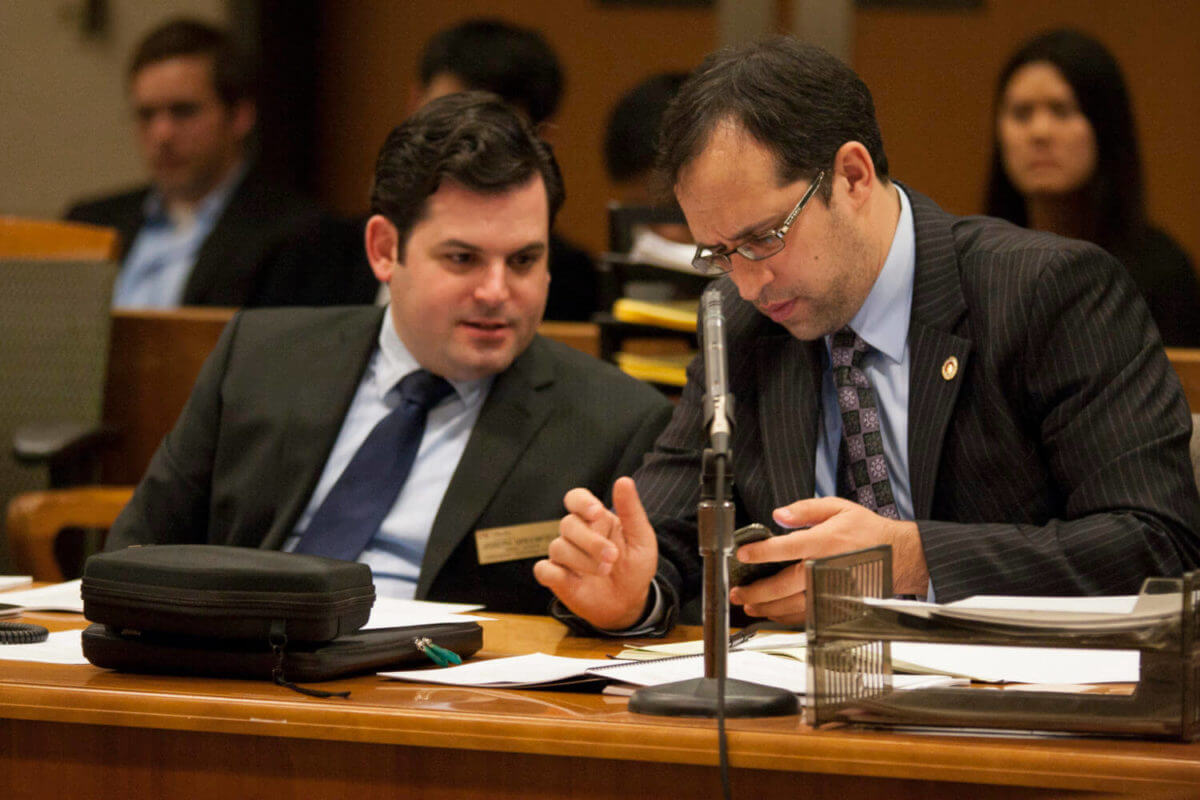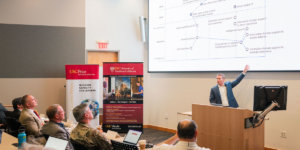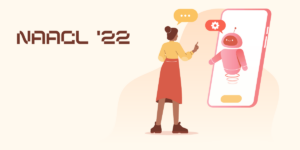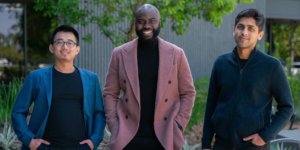
THE MOOT COURT EXERCISE WAS HELD AT THE L.A. AIRPORT COURTHOUSE. PHOTO / DANIEL DRUHORA
On the afternoon of Friday, April 28, 13 expert witnesses waited outside the closed door of Department 083 at the L.A. Airport Courthouse. Some paced the hall; others chatted nervously, shuffling papers and eyeing the courtroom entrance.
These men and women are undergraduates in USC Viterbi’s Information Technology Program. For the past year, they’ve been studying digital forensics with Associate Professor Joseph Greenfield, who also works professionally with the L.A. computer forensics firm Maryman & Associates.
As part of their course final, the students participated in a moot court exercise. This year’s simulated case required the aspiring cybersecurity experts to investigate a corporate espionage scandal.
“We have real attorneys, a real courtroom and a real simulated case. This is the only time they’ll be able to testify in which somebody isn’t going to jail or losing money,” Greenfield said.
Students testified in front of L.A. Superior Court Judge Kathryn Solorzano and were questioned by Senior Special Agent Jack Furay of the U.S. Secret Service for the defense and Benyomin Forer, L.A. deputy district attorney, for the prosecution. Also present at the mock trial were 55 industry professionals, who were there to provide support and recruit potential employees.
“Many industry partners are looking to recruit top-quality talent,” Greenfield said. “What better way to do that than to observe students in a high-pressure environment and watch them sweat it out on the stand?”
Recruiters hailed from a range of organizations, including Bank of America, Ernst and Young, 21st Century Fox, the Department of Homeland Security, the California Department of Justice and the FBI.
Greenfield created the moot court exercise through an academic partnership he formed with the U.S. Secret Service. Now in its ninth year, the drill gives students a chance to test their knowledge of digital forensics, which uses scientific techniques to recover data from computers and other digital devices. In Greenfield’s class, students learn how to perform a computer forensics investigation, practice writing forensics reports and prepare for the trial.

PROFESSOR JOE GREENFIELD (LEFT) AND L.A. DEPUTY DISTRICT ATTORNEY BENYOMIN FORER. PHOTO / DANIEL DRUHORA
Career professionals say this is an invaluable opportunity. Due to the strength of digital evidence, cybersecurity cases rarely go to trial—and when they do, the stakes are high. While many schools offer mock trials for students, it’s rare that they bear “so many similarities to reality,” according to Greenfield.
During the trial, students waited in the hallway as the defense summoned them one by one to the witness stand. Once in the courtroom, each student spent five to ten minutes answering questions about the simulated case, a corporate espionage scandal involving pilfered company data. After being questioned by the prosecution and cross-examined by the defense, each student retired to the jury box to watch their classmates take the stand.
Judge Solorzano, who opened the event by pledging to conduct the proceedings as true-to-life as possible, was thoroughly impressed by the students’ performance. “This is a very sophisticated subject matter, so the fact that you’re receiving this education will put you so far ahead and open so many doors for you,” she told the class after the exercise.
The moot court event was the culmination of two semesters studying digital forensics with Greenfield, who in his 11 years at USC has developed 10 courses and two academic minors: Applied Computer Security and Digital Forensics. Upon returning from spring break, students received a briefing about the case, and spent three days per week thereafter preparing for the trial. Each student drafted a report based on the evidence, some upwards of 60 pages.
“When you go in and prepare as long as we did in this class, it’s really rewarding to sit there and have a chance to defend your work,” said Sean Straw, who participated in the moot court exercise in 2016 and is now a TA for the class.
Straw, a senior majoring in computer science, dates his fascination with cybersecurity to sixth grade, when he first tried breaking into his family’s router. He has mentored digital forensics students for five semesters, helping them hone technical skills and search for career opportunities. For the past six weeks, he’s helped Greenfield’s students write reports and prepare to be grilled on the stand.
“Cybersecurity is something I’m really passionate about, and I enjoyed the experience with moot court so much,” Straw said. “It’s rewarding to be able to come back and work with students on an experience that I think they’ll remember for the rest of their lives.”
Kshitij Kumar, a second TA who also took the course last year, approached Greenfield last summer about creating a new simulated case for the trial. After getting the green light, he’s spent the past year designing the new exercise, which challenges students to investigate a complex system of multiple devices.
“In this day and age, cases rarely involve a single computer,” he said. “Data is being transferred and when information is compromised, there are typically multiple devices involved.”

KSHITIJ KUMAR TOOK THE STAND DURING HIS MOOT COURT APPEARANCE IN 2016. PHOTO / DANIEL DRUHORA
Kumar said a major takeaway from his experience at the trial was learning how to keep a level head and speak concisely. Attending a mock trial in a real courtroom, where each witness was sworn in by a clerk to tell “the truth, the whole truth and nothing but the truth,” also served as a reminder of the stakes in a trial.
“Your job as an expert witness is not to speak to help either the prosecution or the defense, but rather to speak the truth. That’s something that can be easy to forget,” Kumar said.
Greenfield’s class finished the day feeling both exhausted and immensely relieved. Richard Podkowski, a junior studying public relations and pursuing a career in law enforcement, called the entire experience “nerve-wracking.”
“But that said, getting cross-examined in a real-world setting is something not many students get to practice,” Podkowski said. “If I have to do it a second time, I know I’ll be a lot less nervous.”
Published on June 19th, 2017
Last updated on November 8th, 2017












